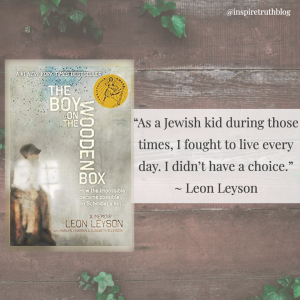
The name Oskar Schindler is known around the world. During the Holocaust, more than a thousand Jews were saved because of Schindler’s List; however, have you ever wondered about the people whose names were written on the famous list?
Leon Leyson (born Leib Lezjon) was the youngest to be included. In 2013, his memoir, The Boy on the Wooden Box, was published and tells the story of the childhood he lost, the family he loves, and the Nazi hero who had nothing to gain.
A hidden gem in a sea of countless publications, Leon’s story is written more like a conversation than an account of his life. As you read, it feels as if Leon is in the room with you, laughing at his rambunctious antics and crying when he thinks of the pain and loss he experienced during the war. With each page, you become an intimate friend of the Leyson family, completely absorbed into their story and the things they went through to survive.
Beginning with life before the war, Leon shares how his family came from a small Polish town until his father got a job at a glass factory in Krakow. The Leysons relocated to the big city where there were lots to explore and much to learn. However, the joy of new wonders and childhood were soon snatched away when the Nazis took occupation of the city.
Innocent and unaware of the imminent threat the Nazis presence posed to him, Leon endured many life-threatening situations before learning the art of blending in. It was survival of the fittest, and as conditions continued to disintegrate, Leon became determined to be useful to his family. Despite his size and lack of skill, Leon proved his worth and later caught the eye of Oskar Schindler. When the war ended, Leon looked back on the years of his childhood with sorrow, but he also remained thankful for the light that shone amid the darkness.
An incredible tale of strength and courage, The Boy on the Wooden Box takes readers behind the scenes of Oskar Schindler’s factory, along with giving a detailed description of a family who was torn apart and given no hope for a future. No one can begin to comprehend what it was like to suffer such persecution except those who survived the Holocaust. This became evident when Leon recalls speaking to an American about what it was like to be starving during the war. The American’s response personified just how inhumane and sadistic the Nazis’ treatment towards the Jewish people, along with the millions who did not fit the Aryan race quota, truly was.
Each moment of this book left me hanging on for more. Leon had me on the edge of my seat as he continued to share the narrative of his life. I felt every emotion that had been written, and when the last word was read, I felt overwhelmed at the endurance of a people who were stripped to nothing. Leon Leyson’s life is inspirational and a testament that even amid pain and suffering, there is still hope! May his life, and the lives of the survivors, always be remembered, and the legacy of Oskar Schindler remain forever!
[yasr_multiset setid=0] Ages:14+
